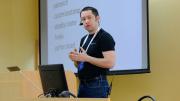
Andrey Fefelov
Mastery.pro
10:00
04 February
90 min
Postgres + patroni + consul + s3 + walg + ansible = Simple HA cluster
Patroni is getting art of state standard framework for building HA clusters with postgres now.
During session we will build simple 3 node cluster using mentioned stack.
We will discuss patroni's architecture, and most interesting parameters from it's configuration. We will check how actually failover works and how could you initialise cluster.
After session you will be able to built such cluster from scratch in minutes using given ansible playbooks.